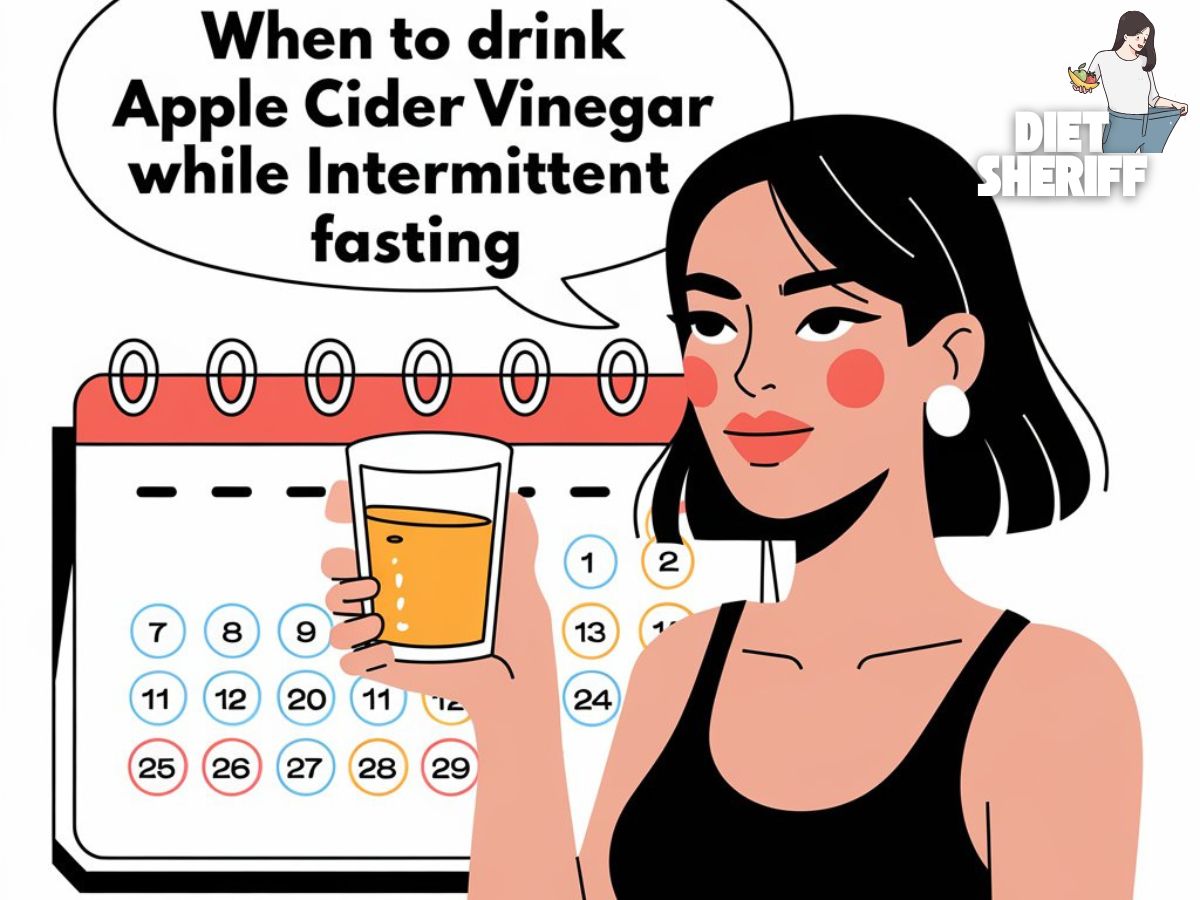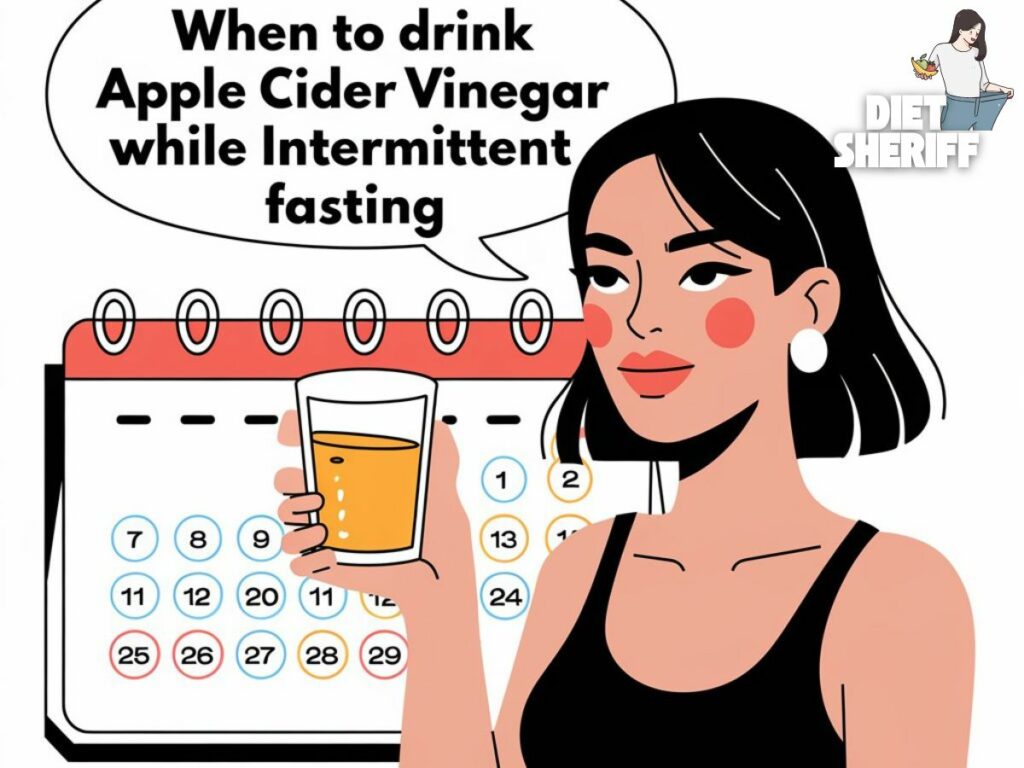Apple cider vinegar (ACV) has gained popularity as a potential aid in weight loss and blood sugar regulation.
When combined with intermittent fasting, which is widely adopted for weight management and overall health, ACV can be particularly effective.
Intermittent fasting involves alternating cycles of eating and fasting or reducing calorie intake over a specific period.
However, to maximize its benefits, paying attention to the timing of ACV consumption is crucial. This article will explore when to drink apple cider vinegar while intermittent fasting.

Key Takeaway
Expert Guide
What is Apple Cider Vinegar?
Apple cider vinegar (ACV) is derived from fermented apple juice, resulting in a highly acidic liquid. It’s commonly used in cooking and salad dressings.
During fasting, consuming small quantities of ACV is generally acceptable, as it doesn’t disrupt ketosis.
It contains the ‘mother’—beneficial bacteria, enzymes, and proteins—and doesn’t require refrigeration.
Related Articles: What Happens When You Mix Baking Soda and Apple Cider Vinegar?

Despite its strong taste, ACV offers health benefits as it matures. The longer it ages, the more nutrient-rich it becomes.
ACV may help maintain satiety during fasting, but excessive consumption should be avoided. Raw organic ACV, rich in beneficial compounds, is crafted from freshly crushed apples.
Related Articles: How To Make Buttermilk with Apple Cider Vinegar?
What is Intermittent Fasting?
Intermittent Fasting (IF) is an eating pattern that cycles between periods of fasting and eating. It doesn’t specify which foods to eat but rather when to eat them. The common methods include:
- 16/8 method: 8-hour eating window, 16-hour fasting period.
- Eat-stop-eat: 24-hour fast once or twice a week.
- 5:2 diet: Consume 500–600 calories on two nonconsecutive days, eat normally on other days.
Intermittent fasting (IF) impacts various aspects of our physiology. Firstly, it influences hormones. During fasting, human growth hormone (HGH) levels increase, while insulin levels decrease.

Secondly, IF triggers cellular repair processes by altering gene expression. Lastly, the reduced eating window often results in fewer daily calories consumed, leading to weight loss.
Related Articles: Does Apple Cider Vinegar Get Old?
When to Drink Apple Cider Vinegar While Intermittent Fasting?
Intermittent fasting constitutes a lifestyle and eating pattern. Rather than concentrating on specific foods, it emphasizes the timing of meals. This principle extends to beverages as well.
Apple Cider Vinegar While Intermittent Fasting
During intermittent fasting, it is advisable to consume zero-calorie fluids such as water, lemon water, black coffee, unsweetened teas, and certain apple cider vinegar.
However, there exists a ‘50-calorie rule’ that permits a slight deviation by allowing some beverages without disrupting the fast.
For individuals aiming for weight loss, consuming 1-2 tablespoons (15–30 ml) of apple cider vinegar during fasting is unlikely to disrupt the process and may even enhance weight loss by positively affecting insulin levels.
As long as the calories are not derived from sugar, they should not significantly impede your progress.
Apple cider vinegar (ACV) can be advantageous during fasting. Although it contains minimal carbohydrates and is unlikely to disrupt your fast, it may help curb cravings and hunger.
Research indicates that incorporating vinegar into meals enhances satiety and regulates blood sugar levels.
Related Articles: Should Apple Cider Vinegar Be Taken on an Empty Stomach?
Can You Drink Apple Cider Vinegar on An Empty Stomach?
Apple cider vinegar is most effective when consumed on an empty stomach, approximately 15-30 minutes before a meal.
To optimize its impact on blood sugar regulation, consider incorporating a small amount of apple cider vinegar before every meal, not only during fasting periods diet sheriff.
Diluting it in water is crucial; mix one to two tablespoons in a full glass of water when consuming it. For variety, explore different apple cider vinegar recipes available online.
Optimal Timing for Apple Cider Vinegar While Intermittent Fasting
If you are curious about incorporating apple cider vinegar into your intermittent fasting routine, optimizing the fasting regimen for optimal results is also significant.
During intermittent fasting, ACV may be consumed in small amounts, as it contains minimal calories and is unlikely to break a fast.
Theoretically, you can use ACV before each meal, but the most effective time is before breaking your fast.

Experts suggest that the best time to take ACV is ideally 15 minutes before your first meal. While some prefer taking it in the morning on an empty stomach, others find it more beneficial before meals to aid digestion.
This timing may help in regulating blood sugar levels, which is particularly beneficial after a fasting period. Additionally, it will potentially help increase feelings of fullness.
Effect of Apple Cider Vinegar While Intermittent Fasting
Apple cider vinegar (ACV) is safe during fasting, but moderation is crucial. Avoid large undiluted quantities, which could disrupt fasting and cause side effects like tooth damage, throat irritation, and stomach upset.
Stick to 1–2 tablespoons daily, diluted in water. Consider supplements or using a straw to protect teeth. If symptoms persist, take a break from ACV.
Apple cider vinegar (ACV) contains only 0.01 grams of carbohydrates per tablespoon.
During fermentation, most of the carbs in ACV are converted into acetic acid. As a result, the small amount of carbs in ACV won’t trigger an insulin response.
In comparison, balsamic vinegar has 300 times more carbs, and rice vinegar has 600 times more carbs than ACV.
Using a splash of ACV in salads or savory recipes is unlikely to affect blood sugar levels, but it’s essential to check nutritional labels for high-carb vinegars like certain balsamic varieties.
Note: It is generally recommended to dilute ACV in water to minimize potential damage to tooth enamel and the stomach lining. Also, opt for the original liquid form; avoid capsules or gummy alternatives.
Explore Also:
Creativehouseblog
Gigasecurehome
Mycleanseplan
FAQs Of When to Drink Apple Cider Vinegar While Intermittent Fasting
How apple cider vinegar benefits weight loss?
ACV has been found to help stabilize post-meal blood glucose levels. This is crucial for weight loss because high blood glucose triggers insulin release, which can hinder fat burning and promote fat storage.
How do you use apple cider vinegar?
Dilute ACV before consuming it. The liquid form is recommended over capsules or gummies.
Why to take apple cider vinegar before bed?
The liver releases glucose at night to maintain blood sugar levels during sleep. Insulin resistance can disrupt this balance, leading to high morning blood sugar levels (the dawn effect). Apple cider vinegar (ACV), with its anti-glycemic properties, may help normalize blood sugar. Consuming ACV before bed or using capsules can offset the dawn effect.
Is balance diet is necessary with consuming apple cider vinegar?
Yes, it is important to note that while ACV can be a helpful addition to an intermittent fasting regimen, it is not a cure-all and should be used in conjunction with a balanced diet and healthy lifestyle.
Note: Remember, ACV is not a magic pill, and it won’t compensate for an unhealthy diet. Pair it with proper nutrition and intermittent fasting for better results. For personalized advice, it’s best to consult with a healthcare professional or a registered dietitian.






